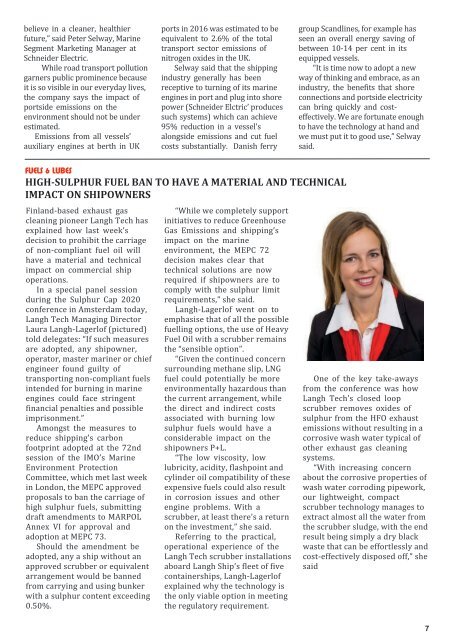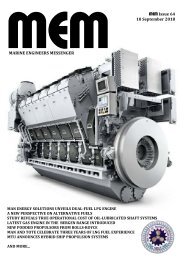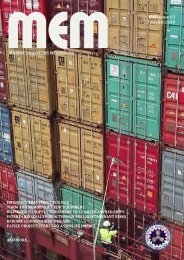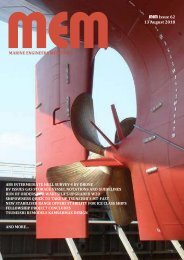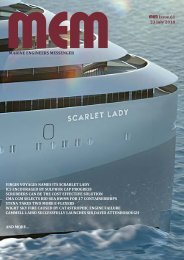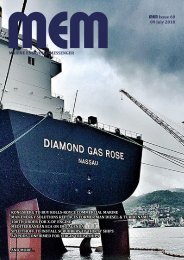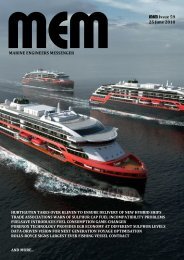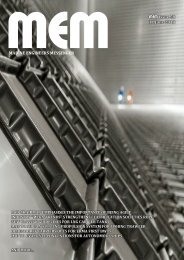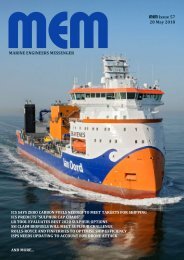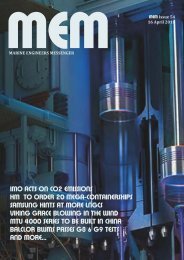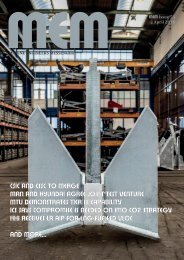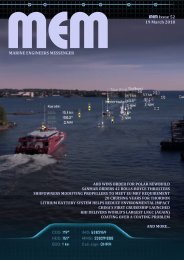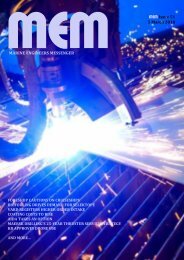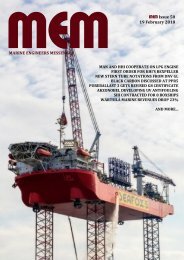Create successful ePaper yourself
Turn your PDF publications into a flip-book with our unique Google optimized e-Paper software.
elieve in a cleaner, healthier<br />
future,” said Peter Selway, Marine<br />
Segment Marketing Manager at<br />
Schneider Electric.<br />
While road transport pollution<br />
garners public prominence because<br />
it is so visible in our everyday lives,<br />
the company says the impact of<br />
portside emissions on the<br />
environment should not be under<br />
estimated.<br />
Emissions from all vessels’<br />
auxiliary engines at berth in UK<br />
ports in 2016 was estimated to be<br />
equivalent to 2.6% of the total<br />
transport sector emissions of<br />
nitrogen oxides in the UK.<br />
Selway said that the shipping<br />
industry generally has been<br />
receptive to turning of its marine<br />
engines in port and plug into shore<br />
power (Schneider Elctric’ produces<br />
such systems) which can achieve<br />
95% reduction in a vessel’s<br />
alongside emissions and cut fuel<br />
costs substantially. Danish ferry<br />
group Scandlines, for example has<br />
seen an overall energy saving of<br />
between 10-14 per cent in its<br />
equipped vessels.<br />
“It is time now to adopt a new<br />
way of thinking and embrace, as an<br />
industry, the benefits that shore<br />
connections and portside electricity<br />
can bring quickly and costeffectively.<br />
We are fortunate enough<br />
to have the technology at hand and<br />
we must put it to good use,” Selway<br />
said.<br />
FUELS & LUBES<br />
HIGH-SULPHUR FUEL BAN TO HAVE A MATERIAL AND TECHNICAL<br />
IMPACT ON SHIPOWNERS<br />
Finland-based exhaust gas<br />
cleaning pioneer Langh Tech has<br />
explained how last week’s<br />
decision to prohibit the carriage<br />
of non-compliant fuel oil will<br />
have a material and technical<br />
impact on commercial ship<br />
operations.<br />
In a special panel session<br />
during the Sulphur Cap 2020<br />
conference in Amsterdam today,<br />
Langh Tech Managing Director<br />
Laura Langh-Lagerlof (pictured)<br />
told delegates: “If such measures<br />
are adopted, any shipowner,<br />
operator, master mariner or chief<br />
engineer found guilty of<br />
transporting non-compliant fuels<br />
intended for burning in marine<br />
engines could face stringent<br />
financial penalties and possible<br />
imprisonment.”<br />
Amongst the measures to<br />
reduce shipping’s carbon<br />
footprint adopted at the 72nd<br />
session of the IMO’s Marine<br />
Environment Protection<br />
Committee, which met last week<br />
in London, the MEPC approved<br />
proposals to ban the carriage of<br />
high sulphur fuels, submitting<br />
draft amendments to MARPOL<br />
Annex VI for approval and<br />
adoption at MEPC 73.<br />
Should the amendment be<br />
adopted, any a ship without an<br />
approved scrubber or equivalent<br />
arrangement would be banned<br />
from carrying and using bunker<br />
with a sulphur content exceeding<br />
0.50%.<br />
“While we completely support<br />
initiatives to reduce Greenhouse<br />
Gas Emissions and shipping’s<br />
impact on the marine<br />
environment, the MEPC 72<br />
decision makes clear that<br />
technical solutions are now<br />
required if shipowners are to<br />
comply with the sulphur limit<br />
requirements,” she said.<br />
Langh-Lagerlof went on to<br />
emphasise that of all the possible<br />
fuelling options, the use of Heavy<br />
Fuel Oil with a scrubber remains<br />
the “sensible option”.<br />
“Given the continued concern<br />
surrounding methane slip, LNG<br />
fuel could potentially be more<br />
environmentally hazardous than<br />
the current arrangement, while<br />
the direct and indirect costs<br />
associated with burning low<br />
sulphur fuels would have a<br />
considerable impact on the<br />
shipowners P+L.<br />
“The low viscosity, low<br />
lubricity, acidity, flashpoint and<br />
cylinder oil compatibility of these<br />
expensive fuels could also result<br />
in corrosion issues and other<br />
engine problems. With a<br />
scrubber, at least there’s a return<br />
on the investment,” she said.<br />
Referring to the practical,<br />
operational experience of the<br />
Langh Tech scrubber installations<br />
aboard Langh Ship’s fleet of five<br />
containerships, Langh-Lagerlof<br />
explained why the technology is<br />
the only viable option in meeting<br />
the regulatory requirement.<br />
One of the key take-aways<br />
from the conference was how<br />
Langh Tech’s closed loop<br />
scrubber removes oxides of<br />
sulphur from the HFO exhaust<br />
emissions without resulting in a<br />
corrosive wash water typical of<br />
other exhaust gas cleaning<br />
systems.<br />
“With increasing concern<br />
about the corrosive properties of<br />
wash water corroding pipework,<br />
our lightweight, compact<br />
scrubber technology manages to<br />
extract almost all the water from<br />
the scrubber sludge, with the end<br />
result being simply a dry black<br />
waste that can be effortlessly and<br />
cost-effectively disposed off,” she<br />
said<br />
7


